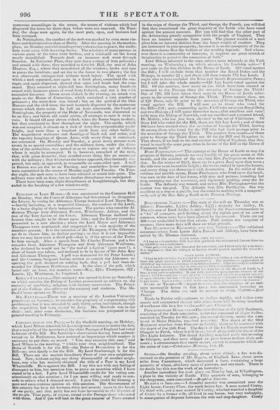CONSTITUTION or THE Per.;:s.—At the Sheffield meeting, on Mofiday, which
Lord Milton attended, his Lordship took occasion to notice the fact, that a majority of the members of the older Peerage of England had voted in favour of the Bill. His Lordship's observations having been animad- verted on in Parliament, have assumed an importance which renders it necessary- to put them on record. " You may examine this case," said Lord Milton to the meeting, " within your own neighbourhood. The Duke of Norfolk is for the Bill—the Duke of Devonshire is for the Bill—my own family is for the Bill. My Lord Scarborough is for the Bill. These are the ancient hereditary Peers of your own neighbour- hood. Now, without saying ally thing disrespectful of another neigh- bour, one who has recently obtained the title of a Peer is my Lord Wharncliffe. He is against the Bill. I say this not with any feelingof disrespect to him, but mention him to prove an assertion which I have stated to he a fact. I give Lord Wharncliffe credit for his voting con- scientiously on this occasion ; for I am most willing and ready to con- cede to others what I demand myself. I give him credit for forming .a pure and conscientious opinion on this question. The Government of this country has been for between sixty and seventy years in the hands of one party, and that party has not been favourable to the liberties of the people. That party, of course, raised to the Peerage those who acted with them And if you will look to the great number of Peers created in the reign of George the Third, and George the Fourth, you will find that they constituted the great majority of the Lords who have voted against the present measure. But you will find that the other part of the Aristocracy greatly sympathize with the people of England. They have no interest separate from yours. The greater wealth of a man gives him no interest distinct from the lesser wealth of another. They are interested in your prosperity, because it is on the prosperity of the in- dustrious classes that the welfare of the wealthy depends. And where- ever there is a community of interests, h requires no great stretch of imagination to perceive the connexion of both."
Lord Milton adverted to the same subject more minutely at the York meeting, on Wednesday ; on which occasion his Lordship said—" I now come to the late division in the House of Lords. 199 voted against the Bill ; I will exclude from that number the Royal Dukes and the Bishops, in number 23 ; and there will then remain 176 Lay Lords. I ought also to have excluded the Irish and Scotch Representative Peers; but I will take the whole number-176 Lay Lords voted against the Bill. Of this number, how many do you think have been created or promoted to the Peerage since the accession of George the Third ? Out of 176, 131 have taken their seats in the House of Lords subse- quent to the accession of George the Third. There remain then, out of 176 Peers, only 35 prior to the accession of George the Third, who voted against the Bill. I will now go to those who voted for the Bill-158 ; now, contrasting again, I will take away one Royal Duke and two Bishops ; I will name those two men—that excellent and Irene; rable man the Bishop of Norwich, and may excellent and reverend friend, Dr. Maltby, who has just been elevated to the see of Chichester. Of those 150 who voted for the Bill, there are 155 Lay Lords ; and of these 106 have been created since the accession of George the Third, leaving 49 among those who voted for the Bill who had their peerage prior to the accession of George the Third. The number then stands—of those prior to George the Third there are 49 for the Bill and 35 against it. That shows, if we look to the real ancient nobility of England, that they voted in nearly the same proportion in favour of the Bill as the House of Commons itself."
DAME PARTINGTON.—" The attempt of the House of Lords to stop the progress of Reform, reminds me very forcibly of the great storm at Sid- mouth, and the conduct of the excellent Mrs. Partington on that occa-
sion. In the winter of 18124, there set in a great flood upon that town ; the tide rose to an incredible height ; the waves rushed in upon the houses, and every thing was threatened with destruction. In the midst of this sublime and terrible storm, Dame Partington, who lived upon the beach, was seen at the door of her house, with mop and pattens, trundling her
mop, sweeping out the son-water, and vigorously pushing away the At- lantic. The Atlantic was roused, and so was Sirs. Partington-but the contest was unequal. The Atlantic beat Mrs. Partington. She was excellent at a slop or a puddle, but site could do nothing with a tempest:. --81,celt of the Bee. Sidney Smith ut the Tato,bn Heeling.


























 Previous page
Previous page